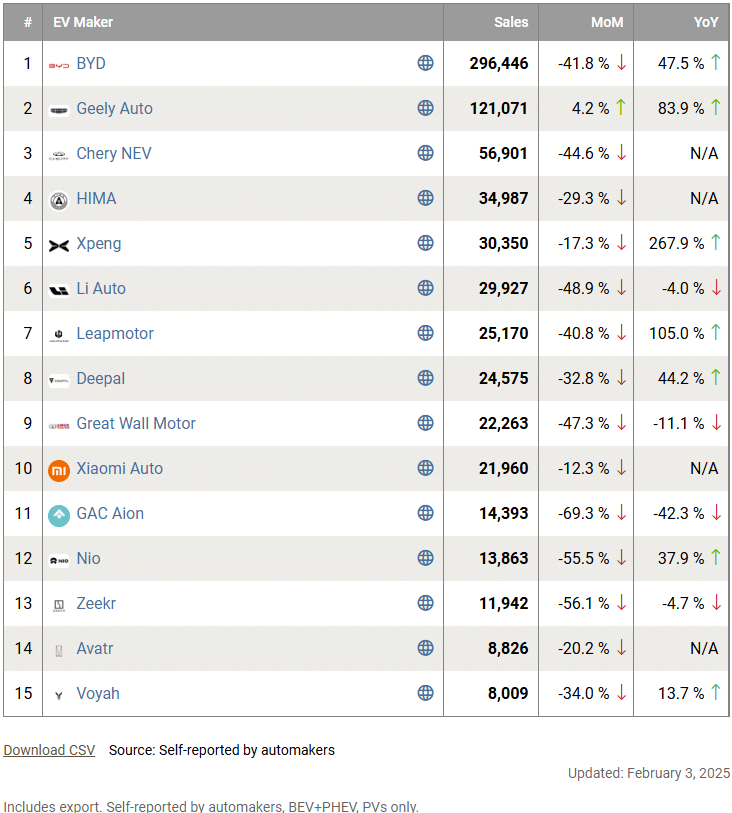Nio 13,863, Xpeng 30,350, Geely 121,071, BYD 296,446
In the first month of the year, all Chinese EV makers’s sales were down MoM, with Geely being an exception. BYD was down 42%, Nio 56%, and Xpeng 17%, while Geely was slightly up 4% compared with December.
- الإعلان - الإعلانات
Key points to follow:
- Xpeng outsold Li Auto, becoming the winner among EV startups
- Nio brand was down from the previous year. Group sales were up only because of the Onvo ramp-up
- Chinese New Year affected sales as usual
- Geely Auto didn’t mind the CNY and increased EV sales compared to December as the only automaker
- Xiaomi maintains strong numbers
All delivery data come from company filings or social media posts, which are reported on the first of each month. Xiaomi is the exception, as it provides only vague numbers such as “20,000+” units. Therefore, the data comes from the China EV DataTracker estimate. The report shows wholesale numbers, including exports, if there are any.
Data show sales of new energy vehicles (NEVs). NEV is a Chinese government term for BEV (battery electric vehicle), PHEV (plug-in electric vehicle), and FCEV (fuel-cell electric vehicle). FCEV (hydrogen) sales are almost non-existent in China.
- الإعلان - الإعلانات
The leaderboard is updated as of February 3, 18:35 China time.
January 2025 Sales
BYD sold 296,446 passenger NEVs in January 2025, down 41.8% from 509,440 in December and up 47.5% from 201,019 the previous year.
Cumulative cumulative vehicle sales in 2024 reached 4,250,370 vehicles, up 41,1% from 3,012,906 units in 2023.
- الإعلان - الإعلانات
BYD sales include the BYD-branded vehicles, Denza, Fang Cheng Bao, and Yangwang brands.
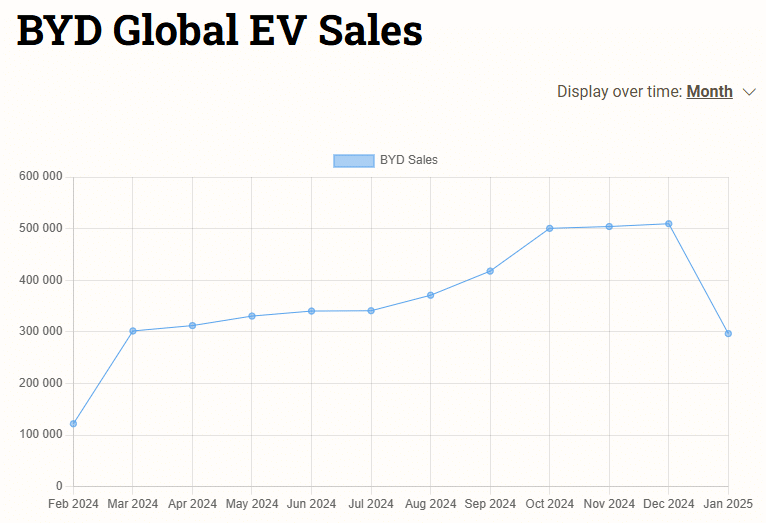
Geely Auto sold 121,071 passenger NEVs in January 2025, up 4.2% from 116,206 in December and 83.9% from 65,959 the previous year.
Cumulative sales 2024 reached 893,235 NEVs, up 83.2% from 487,461 units in 2023.
Geely Auto NEV sales include its main brand and series Zeekr, Lynk&Co, and Geely and Geely Galaxy.
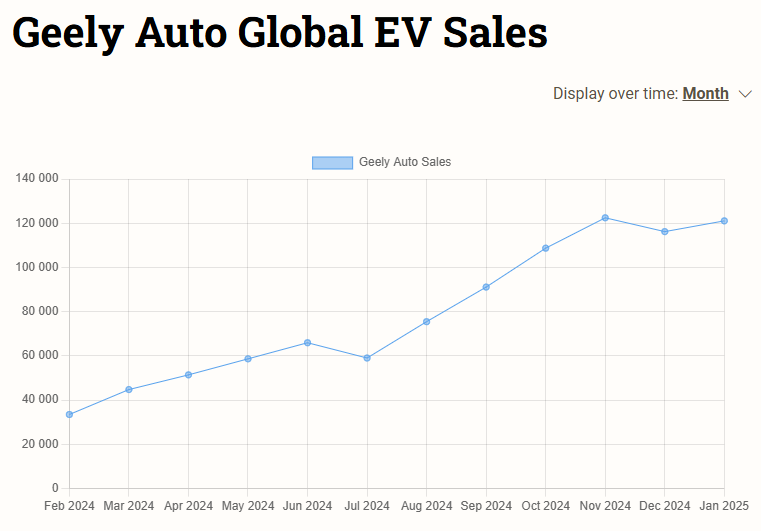
HIMA sold 34,987 EVs, down 29.3% from 49,474 units in December. HIMA (Harmony Intelligent Mobility Alliance) is Huawei’s EV alliance, including four brands: Aito, Luxeed, Stelato, and Maextro.
Xpeng sold 30,350 passenger NEVs in January 2025, down 17.3% from 36,695 in December and up 267.9% from 10,668 the previous year.
About half of Xpeng’s sales were driven by the Mona series. Xpeng itself is a mass-market brand, the Mona series is an entry-level compared with the main brand. It currently sells only one car – the Mona M03 sedan, which starts at 119,800 yuan (16,500 USD) and was launched in August 2024. Xpeng sold over 15,000 units of Mona M03 in January.
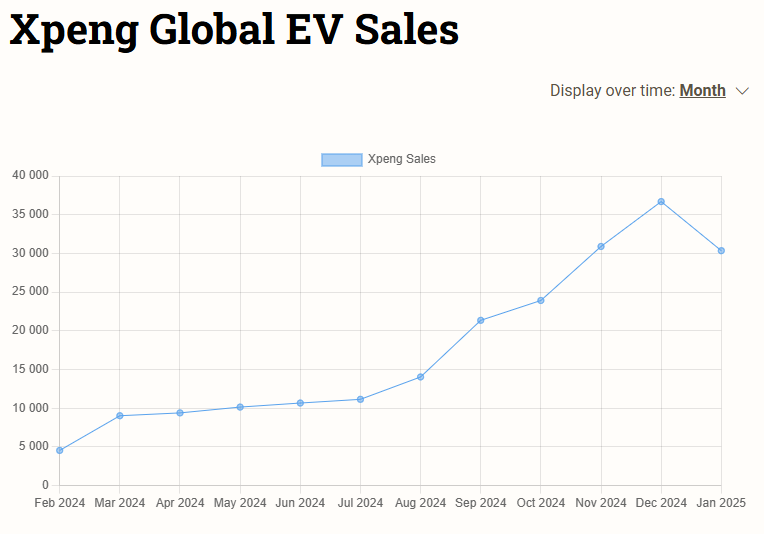
Li Auto sold 29,927 passenger NEVs in January 2025, down 48.9% from 58,513 in December and 4.0% from 31,165 the previous year.
Li Auto sales are mainly driven by L6 SUV, which is responsible for about 50% of Li sales. L6 was launched in April 2024 for 249,800 yuan (34,500 USD) as one of the cheapest Li Auto models. The EREV SUV surpassed the 200,000 unis delivery milestone last month, according to Li Auto.
Li Auto sells mainly EREVs, with Li Mega minivan being an exception. It is an all-electric MPV launched in early 2024 but struggles to gain sales. In December, the company sold a little over 1,200 units in China, making it about 2% of company sales.
Cumulative sales in 2024 reached a record-breaking 500,508 NEVs, up 33.1% from 376,030 units in 2023. Li Auto reported it is the first Chinese EV startup to surpass the 500,000 annual milestone.
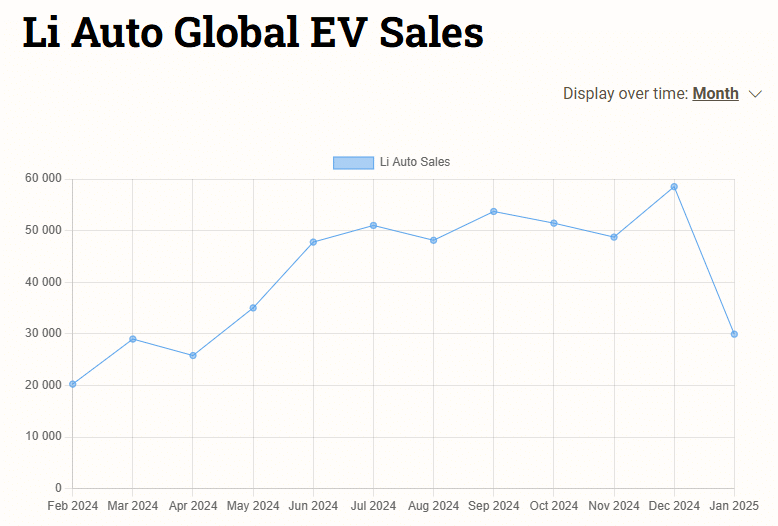
On January 25, the Beijing-based company announced its total deliveries exceeded 150,000 units. Xiaomi plans to sell 300,000 cars in 2025, surpassing 135,000 units in 2024.
Nio group sold 13,863 passenger NEVs in January 2025, down 55.5% from 31,138 in December but up 37.9% from 10,059 the previous year.
Nio main brand sold 7,951 cars, down 21% from 10,055 units in January 2024 and 62% from 20,610 in December.
Entry-level brand Onvo sold 5,912 of its only car, the L60 SUV, down 44% from 10,528 units in December. Onvo launched in September, and the company’s president, Alan Ai, previously announced that if the company doesn’t reach 10k deliveries in December, he will resign.
Onvo L60 starts at 149,900 yuan (20,770 USD) in China with a 60 kWh BYD battery. Many analysts pointed out possible cannibalization between Onvo and Nio models, especially its best-seller ES6 SUV.
Nio ES6 (EL6 in Europe) starts at 338,000 yuan (46,600 USD) and, in many aspects, offers similar specs as Onvo L60. Nio ES6 is currently responsible for about 35% of Nio sales. Nio ET5/T is responsible for another 40%.
Cumulative sales in 2024 reached 221,970 NEVs, up 38.7% from 160,038 units in 2023. In 2025, Nio plans to sell 440,000 vehicles of which half would be regarded to Onvo.
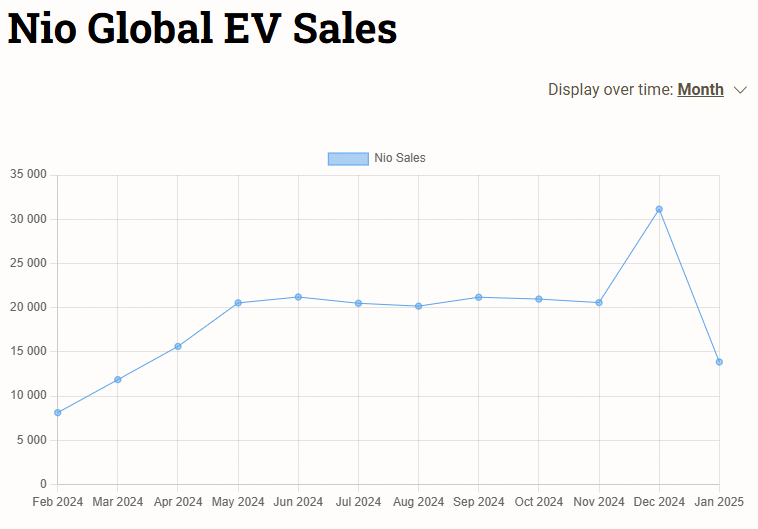
Xiaomi said it sold over 20,000 units of its only car SU7 sedan. According to China EV DataTracker estimate, the company’s January sales were 21,960 units, down 12.3% from 25,035 units in December.
Xiaomi launched its first car, SU7 sedan, in March last year, with deliveries beginning in April. SU7 starts at 215,900 yuan (29,800 USD) in China. In July, the company will release its second car, the YU7 SUV.
Changan and SAIC haven’t yet shared their data, and it is not sure they will as sometimes they do not publish NEV monthly sales reports. We will keep an eye on it.
